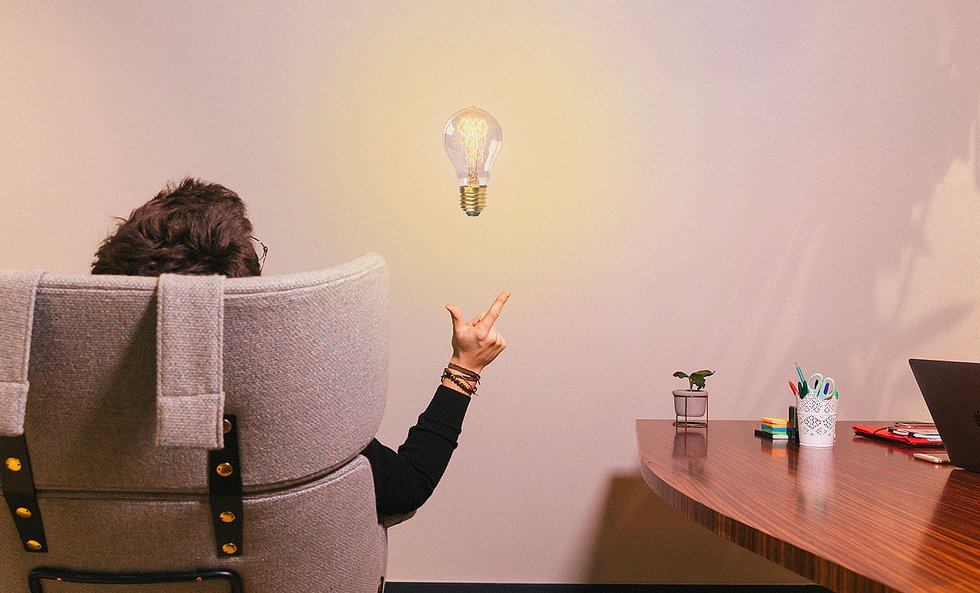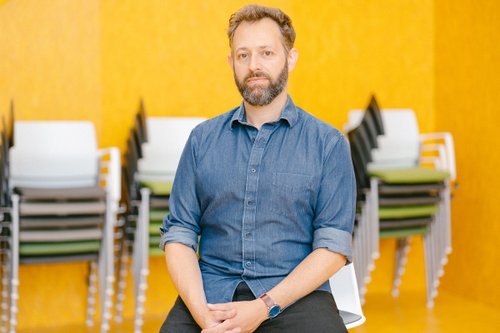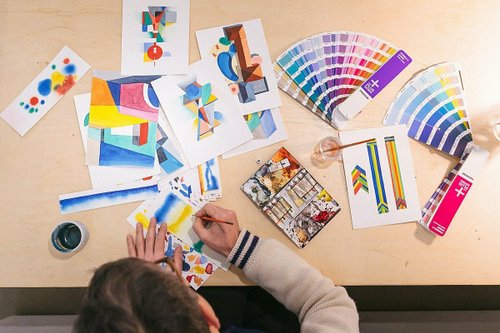Guide to being creative at work (regardless of your position)
Feb 12, 2020
5 mins


Redactor freelance especializado en tecnología y startups
Does going to work generate apathy brought on by your monotonous routine? Do you spend eight hours in the office wearing a face that looks as if you’re doing your tax return—and you’re in for a big bill? Have you reached that point where you don’t really care about anything you do, you are unable to enjoy your day-to-day professional life and your only motivation is getting paid at the end of the month?
Don’t worry, you’re not alone. There are many people in the same position as you, but luckily, there is a way out: by getting creative. Even if your position doesn’t theoretically have a creative profile, and this may seem a far-fetched idea, creativity can become your best ally.
1. Break routine
Letting yourself slip into a monotonous routine every time you step into the office or turn on the computer to start working is the professional equivalent of dying a slow death. You will collapse with exhaustion, your work performance will suffer and you will get ever closer to total life dissatisfaction. It’s time to incorporate some novel ideas into your work days to stop them merging into one. This will also make you feel there are different dimensions to your job:
- Change work tools. Some have to stay because they do not depend on you, but rather on the company and your position. However, there are many ways to organise yourself, devices to be used and methods to be applied.
- Change the order of your tasks. There are tasks that can’t be moved—surely we shouldn’t wait to check emails until the end of the day—but perhaps we can modify the order of other tasks to give us a feeling of breaking routine, such as holding lunch meetings or preparing reports in the afternoon when it’s usually something you do at the start of the day.
- Take on new tasks: Is there any other team or department that you could help out with your experience? Are there any projects you would like to work on? Do not hesitate to discuss them with your colleagues and bosses.
- Work from another location: If your position allows it, try working from a different space within the company or, if you have not already done so, start working remotely now and then.
Remember, there are dozens of changes that you can incorporate into your daily work life to help leave the monotony behind. For example, work standing up for a few hours instead of spending the whole day sitting, change your desk layout, make plans with your colleagues or walk to work, taking the opportunity to clear your head, and have a coffee along the way.
“Routine kills creative thought” - Scarlett Thomas
2. Propose ideas
You may think that you need creative flair to come up with ideas, but the opposite can be true. Simply having the intention to propose new ideas pushes you to think differently, to look at your surroundings from another perspective in search of that possible lightbulb moment.
For this, a change of attitude is necessary. If we stop looking at the work environment in a conventional way, and think outside the box, we could come up with creative ways to start giving 100% to the job. An example? In the 1950s, no one thought that sweets could improve on anything other than their shelf life before the taste deteriorated. Only Enric Bernat, the founder of Chupa Chups, came up with the idea of putting a stick into a boiled sweet so you could pop it in and out of your mouth without getting stained, sticky hands. The rest is history.
Start by rethinking everyday situations. For example, is that software tool the best option for organising teamwork? If it is, are we using it in the most effective way or could we improve on any part of the process?
“To raise new questions and possibilities, to regard old problems from a new angle, requires creative imagination and marks real advance in science.” - Albert Einstein
3. Set deadlines
Parkinson’s law recommends caution when it comes to giving a timeframe to complete a task because we often tend to use all the given time available, even if we don’t really need it. However, setting a deadline can have a very positive effect on creativity.
The trick is to be realistic, yet slightly ambitious when setting that deadline: this will make our creativity skyrocket so that we can achieve the best results before it’s too late.
On the contrary, having tasks without a set completion date makes us feel as if we don’t need to finish them with the same intensity as we do when we see the deadline looming.
Take the test: set deadlines for tasks that don’t have any, and see where there might be a particular need to apply creativity. If you’re conscious that time is ticking away, it often helps you think in a different way.
“The ultimate inspiration is the deadline” - Nolan Bushnell, video game industry pioneer
4. Keep learning
The best ideas come from restless and curious people, but also from those who strive to continue expanding their knowledge. In fact, few methods to trigger creativity are as effective as learning and training. There is no one way to do this, so choose the method that suits you best:
- Read books: Think about including reading in your routine. For example, pick biographies of people you are passionate about or essays on topics that interest you. This activity generates a feeling of constant learning and gives you ideas that you can then apply to work.
- Watch movies and documentaries: There are films and TV programmes that leave their mark and drive us to be more creative to stand out from the crowd. If you want to see your day-to-day situations from another perspective, watching movies about strong, colourful personalities, such as artists, entrepreneurs and activists, or documentaries on a variety of themes, not necessarily related to your sector, can be of huge benefit.
- Sign up for courses: The internet has put an infinite number of online courses, seminars, webinars, MOOCs and so on at our disposal, which are often free. The knowledge you acquire will open the doors to creative possibilities that you can apply to your work.
“Creativity is thinking up new things. Innovation is doing new things”-Theodore Levitt
5. Use the creativity of your teammates as a springboard
Use the talents of your teammates to trigger your own creativity—without falling into plagiarism, of course. It’s healthy to seek inspiration from other staff and apply their ideas to your position.
This means that dropping by another department to see how their team operates, or observing how they interact and then applying their methods to your environment, can be good habits to start adopting.
The recruitment company Work4 has launched an exchange programme among its employees called Live My Life so that anyone in any position, including interns, can spend a day learning the work of a colleague with a different role or in another department. In this way, they become familiar with the workflow of other positions and understand their own needs and deadlines better—and, moreover, they manage to get out of routine and gather creative inspiration for when they return to their usual space.
“Creativity is simply about connecting things. When you ask creative people how they did something, they feel a little guilty because they didn’t really do it, they just saw something.” - Steve Jobs
Creativity is not tied exclusively to positions with an artistic element. We all need it to avoid falling into a rut at work, to keep moving forward and to nurture an attitude that staves off boredom. This could be your purpose for the year: replace routine with creativity.
Translated by Sunita Maharaj-Landaeta
Photo: Welcome to the Jungle
Follow Welcome to the Jungle on Facebook, LinkedIn, and Instagram and subscribe to our newsletter to get our latest articles every week!

More inspiration: Creativity

5 books to boost your creativity at work
Creativity at work is important, but sometimes we aren't inspired by our daily lives. We've curated a list of books to kickstart your creative mind!
Oct 04, 2023

How creativity became corporate religion
By idolizing the image of the feverishly driven artist, capitalism created new ways to exploit workers
Sep 05, 2023

Learn to boost your creativity (and let go of your fears)
No one is immune to the effects that negative feedback can have on their creativity. Danielle Krysa, the author of Your Inner Critic is a Big Jerk...
Feb 21, 2022

Take a walk to boost your health and creativity
The simple act of taking a walk improves our general wellbeing, focuses our attention and boosts our creativity.
Apr 14, 2021

Costume drama: exploring the creative process with designer Lorna Mugan
She’s been nominated for a Bafta and an Emmy, but it’s unlikely you’ll recognise her face. Meet Lorna Mugan, a costume designer from Donegal.
Oct 12, 2020
The newsletter that does the job
Want to keep up with the latest articles? Twice a week you can receive stories, jobs, and tips in your inbox.

Looking for your next job?
Over 200,000 people have found a job with Welcome to the Jungle.
Explore jobs